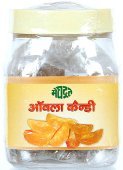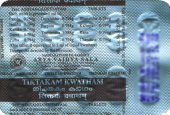Candy: 1 definition
Introduction:
Candy means something in the history of ancient India. If you want to know the exact meaning, history, etymology or English translation of this term then check out the descriptions on this page. Add your comment or reference to a book if you want to contribute to this summary article.
India history and geography
Source: Cologne Digital Sanskrit Dictionaries: Indian Epigraphical GlossaryCandy.—(IA 26), Anglicised form of khaṇdī, a weight of different value in different parts. See khaṇdikā. Note: candy is defined in the “Indian epigraphical glossary” as it can be found on ancient inscriptions commonly written in Sanskrit, Prakrit or Dravidian languages.

The history of India traces the identification of countries, villages, towns and other regions of India, as well as mythology, zoology, royal dynasties, rulers, tribes, local festivities and traditions and regional languages. Ancient India enjoyed religious freedom and encourages the path of Dharma, a concept common to Buddhism, Hinduism, and Jainism.
See also (Relevant definitions)
Starts with: Candy flower, Candy-weed, Candya, Candyweed.
Full-text (+60): Khandivari, Batela, Khadisakhara, Sharkara, Khandi, Khandiganati, Khanda, Khandoganati, Khandava, Candy-weed, Madhuja, Candy flower, Macava, Khadesakhara, Raga, Pancamrita, Rovala, Suvala, Mahagiri, Khandavaraga.
Relevant text
Search found 49 books and stories containing Candy; (plurals include: Candies). You can also click to the full overview containing English textual excerpts. Below are direct links for the most relevant articles:
Tiruvaymoli (Thiruvaimozhi): English translation (by S. Satyamurthi Ayyangar)
Pasuram 2.9.8 < [Section 9 - Ninth Tiruvaymoli (Em ma vittu)]
Pasuram 2.7.3 < [Section 7 - Seventh Tiruvaymoli (kecavan tamar)]
Pasuram 5.9.5 < [Section 9 - Ninth Tiruvaymoli (Man ey nokku)]
Parables of Rama (by Swami Rama Tirtha)
Story 32 - Crazy man‘s Feast < [Chapter VI - Ignorance]
A Vision or Nightmare < [July – September, 1994]
Factors that Count < [January – March, 1985]
The Song of Murad < [June 1945]
Hari-bhakti-kalpa-latikā (by Sarasvati Thkura)
Text 18 < [First Stabaka]
Chaitanya Bhagavata (by Bhumipati Dāsa)
Verse 2.10.315-316 < [Chapter 10 - Conclusion of the Lord’s Mahā-prakāśa Pastimes]
Verse 2.8.293 < [Chapter 8 - The Manifestation of Opulences]
Verse 3.4.467 < [Chapter 4 - Descriptions of Śrī Acyutānanda’s Pastimes and the Worship of Śrī Mādhavendra]
Related products



